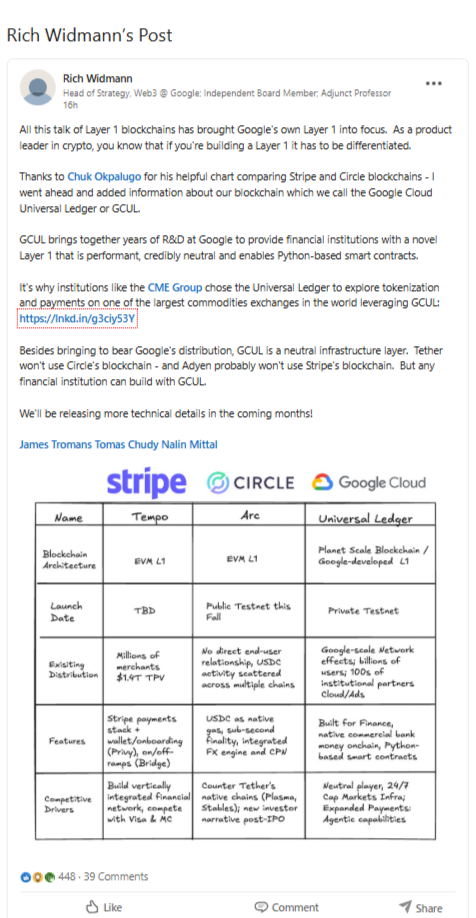It seems Google Cloud has decided to dip its toes into the blockchain pudding, and lo, it emerges with something called the Google Cloud Universal Ledger-or GCUL, if you’re the sort who likes acronyms that sound like a cross between a cough syrup and a second-rate sci-fi villain. But don’t get too excited; this isn’t your run-of-the-mill blockchain where you can trade pixelated apes or mint NFTs of your cat’s sneezes. Oh no, GCUL is far too posh for such plebeian pursuits-it’s been tailor-made for large financial institutions, presumably by people wearing monocles and sipping dry martinis.
Rich Widmann, Global Head of Strategy for Web3 at Google Cloud (a title so grand it probably requires its own parking space), took to LinkedIn-yes, *that* LinkedIn-to declare GCUL a Layer 1 blockchain. For those keeping score at home, that puts it in the same league as Ethereum and Solana, though one suspects GCUL would rather sip tea with royalty than hang out with those blockchain ruffians. What sets GCUL apart? Why, Python-based smart contracts, of course! Because nothing says “cutting-edge finance” quite like coding in a language named after Monty Python. Developers, rejoice! You’ll now be able to build financial applications while humming “Always Look on the Bright Side of Life.” 🎵

The plot thickens when we learn that this whole escapade was unveiled earlier this year in cahoots with none other than CME Group, the commodities exchange behemoth. Apparently, they’ve already tested phase one, and GCUL passed with flying colors-or at least didn’t crash spectacularly enough to make headlines. The goal? To enable round-the-clock settlement of things like collateral, margin, and fees, all without breaking the bank-or anyone’s spirit. Broader testing is slated for later this year, with potential services launching sometime in 2026, which gives everyone plenty of time to practice their Python puns.
Widmann also dropped some wisdom about how GCUL is a “neutral infrastructure layer,” meaning Tether won’t use Circle’s blockchain, Adyen won’t touch Stripe’s, but hey, everyone will want to cozy up to GCUL. How could they resist? After all, it’s backed by Google’s global scale, institutional partnerships, and an air of superiority thicker than a British fog. Meanwhile, Circle is busy rolling out Arc, its stab at a stablecoin-focused blockchain, and Stripe is tinkering with Tempo, which apparently plays nicely with Ethereum. But GCUL? Oh, GCUL doesn’t play with others-it presides over them, like a headmaster surveying his unruly pupils. 👨🏫
So there you have it: GCUL, the blockchain that fancies itself above the fray, armed with Python scripts and Google’s gravitas. Whether it succeeds remains to be seen, but one thing’s for sure-it’s already won the award for Most Pretentious Project Name of the Decade. Bravo, Google. Bravo. 👏
Read More
- The Winter Floating Festival Event Puzzles In DDV
- Top 8 UFC 5 Perks Every Fighter Should Use
- Best Video Game Masterpieces Of The 2000s
- USD COP PREDICTION
- Roblox 1 Step = $1 Codes
- Jujutsu Kaisen: Why Megumi Might Be The Strongest Modern Sorcerer After Gojo
- How To Load & Use The Prototype In Pathologic 3
- Upload Labs: Beginner Tips & Tricks
- Jujutsu: Zero Codes (December 2025)
- Best JRPGs With Great Replay Value
2025-08-27 10:48